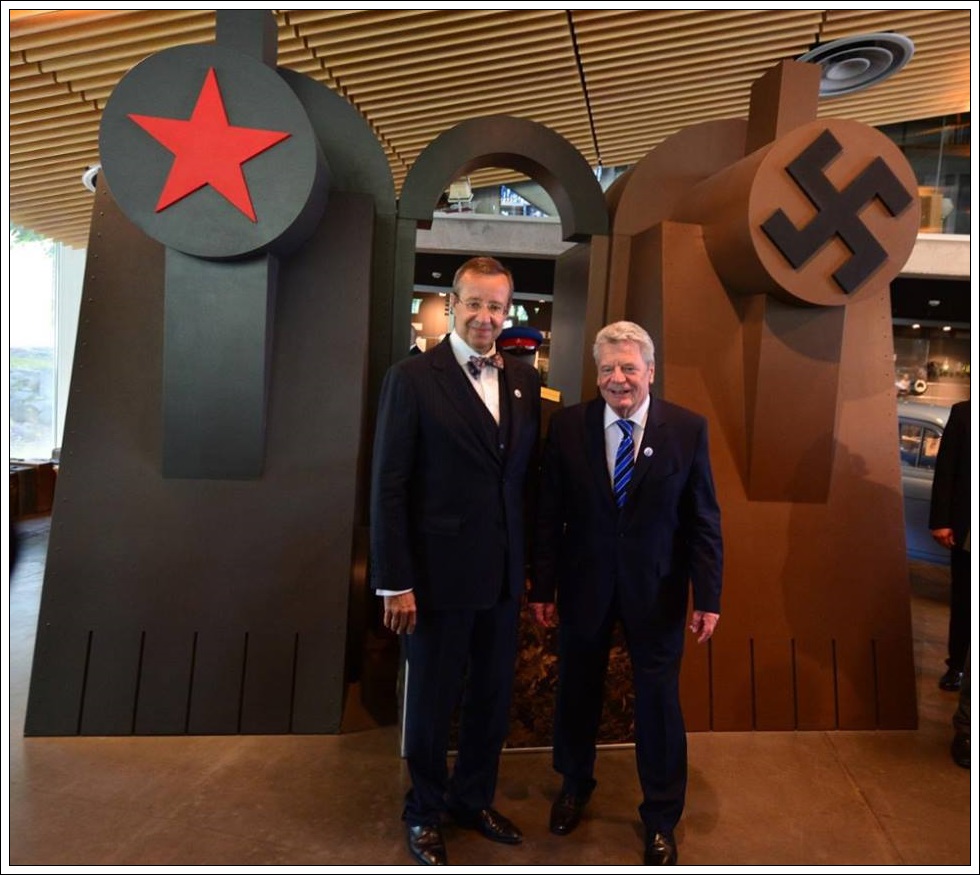by Leena Hietanen (Tallinn)
Germany’s president, Joachim Gauck, welcomed intensified cooperation between Estonian and German historians in the cause of continuing the search for Communist crimes in both Soviet Estonia and East Germany. He posed for photographs alongside Estonian president Toomas Hendrik Ilves with a backdrop of the iconic red-equals-brown Hollywoodesque “set” welcoming visitors to the nation’s Museum of the Occupation in Central Tallinn.

Photo of the two presidents with red-brown-equals-sign backdrop at the Museum of the Occupation in Central Tallinn: Postimees (Erik Peinar). More red-brown iconography here.
The main controversy around the step concerns the links of the partnering institutions, most pronouncedly in Estonia, to far-right revisionism in the spirit of the Double Genocide movement that seeks to establish “equality” of Nazi and Soviet crimes in contexts that have been felt by some to trivialize the Holocaust, cover for East European collaboration in the murder of the Jewish population, and seek to obfuscate the Holocaust more generally by insisting on an artificial symmetry between the two regimes’ records. There are also fears that the movement is used as a political tool today to delegitimize not only liberal and leftist political parties and their members, but the center-left as well.
The Estonian daily Postimees reports that during his official visit to Estonia on July 8th, the German president, himself a native of East Germany and signatory of the Prague Declaration of 2008, invited Estonians to join the “common history” conference in October in Berlin called “European Remembrance: Second International Symposium of European Institutions dealing with 20th Century History.” It is being organized by the Federal Foundation for the Reappraisal of the SED Dictatorship, established in 1998 by the German Parliament. The Estonian participant and the counterpart is the right-wing “Estonian Memory Institute” founded by the president of Estonia, Toomas Hendrik Ilves in 2008. Ilves is an American who worked with Voice of America.
Members of the Estonian Memory Institute include Nicholas Lane, former vice president of the American Jewish Committee, and the renowned Oxford professor Timothy Garton Ash. The Estonian Memory Institute is a constituent member institution of the Platform of European Memory and Conscience, one of the engines of the Double Genocide movement in the European Union.
The Estonian Memory Institute and Germany’s Federal Foundation for the Reappraisal of the SED Dictatorship are intensifying their effort to publish literature and educational material concerning European history in the twentieth century and to strengthen the ongoing “equal evaluation of totalitarian regimes” (one of the popular euphemisms for Double Genocide).
According to the report in Postimees, the two heads of state issued a statement saying that “Today’s debate on the impact of the Communist dictatorships on the development in our societies indicates the need to comprehensively and deeply review the era in question, especially from the perspective of the democratic values of Europe.” The joint statement goes on to say:
“That is why we welcome the German Foundation for the Reappraisal of the SED Dictatorship and the Estonian Memory Institute together in the future to deal with and to study this topic more in-depth.”
Editor’s note: This 15 August update makes a correction re Nicholas Lane’s affiliation. The original publication misidentified him as (currently) president of the American Jewish Committee. Apologies to all concerned.